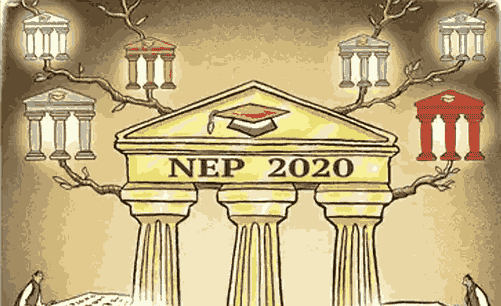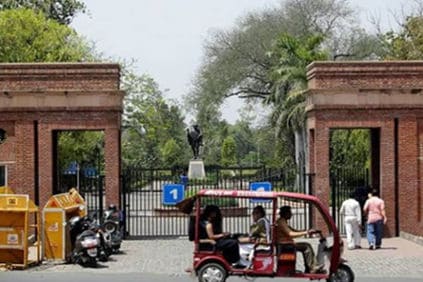The policy-behemoth of 2020, the NEP, has begun to seep into the cogwheels of the state machinery, and an ugly picture now stands before us. Has the NEP oiled the machine or soiled it?
With its first major revision since 1986, the New Education Policy of India (NEP), cradling promises to remedy the fractured education system and its often dysfunctional multiplicity of boards, targeted skill-sets and examination protocols, has finally started to lose moss as it roars down the steep slope of universities and schools dotting the Indian landscape alike, and needless to say, it poses the threat to obliterate the status-quo hitherto observed. The question remains whether an overhaul of such prodigious proportions should be a welcome change. Do Indian institutions, and in fact, the institute that is India itself, possess the capacity to contain it and not crumble in the process? Perhaps a fortification is imperative. Have we given the political and academic structures adequate time to recalibrate and fortify themselves in order to welcome the change?
Indeed, having to model the Indian paradigm of education after the Americans presents appealing prospects to those who wish to pursue their higher education abroad. Statistically, we must determine how much of the student population that truly represents. One need not resort to the numbers, however, to infer that it must not constitute a generous portion of the Indian-student demographic. A disparate wealth distribution in the Indian economy continues to persist, consequently shutting a devastating majority of the population out from access to foreign lands. Education in the UK and the US for just one year is almost as expensive as an Indian’s kidney, if one were to pardon the conceit. Within India itself, private universities cost as much over the course of four years. We may safely say that the structure under the NEP, benefits only a microscopic percentage of Indian students. Simultaneously, it insinuates certain cultural and ideological conflicts.
Of course, change is daunting, abrasive at times. I desire to direct our attention to the realised change therefore; that is where the NEP stands, four years after its conception and more than a year after it having been implemented. Lying beyond the theoretical assent and dissent, how has the change shaped itself in practice?
The syllabi structured under the NEP have introduced subjects such as GE (Generic Elective), SEC (Skill Enhancement Course), VAC (Value Added Course), AEC (Ability Enhancement Course) with the respective departments offering choices from a pool of courses. Some of these courses such as “The Art of Being Happy” may be taught by professors of any and all departments! The obverse side of the coin parades this as ‘holistic development’ that should buttress an individual’s employability. The reverse, practical side of this coin reveals a diluted core syllabus and therein the concomitant and ironic risk of a half-baked education. Can subjects such as ‘Sports for Life’ or ‘Personality Development’ substantially better the depth of a student’s learning, especially at the University level, where courses are supposed to be rather rigorous and demanding?
Professor Debraj Mookerjee, Associate Professor of English at Ramjas College, reflecting on the Economics Honours syllabus for St. Xavier’s University, Kolkata, says,
Of the eight courses being taught, only one is in the Honours subject paper…are the students learning enough about the core subjects to make them optimally employable? Can the other subjects not be self-learnt in the age of the internet?
A 3rd Year English Honours Student at the University of Delhi, Pema Choekyi Thongdok, in conversation with DU Beat, echoes the same concern
Also, while one may argue that papers like yoga, sports, etc. do help in extra-curricular development, I still believe that this should be the choice of the student. A student should not be forced to study a whole new paper, simply in the name of “holistic development”, if it wouldn’t even be of any help to them in the future.
A critically upsetting point that Pema raises is that these subjects, with the exception of the GE courses, may not be repeated after one semester of having studied it. How does one fathom the idea of learning a subject well enough within the span of four months, with six other such courses to cater to, including 3 core papers, to find any practical or academic use for it later in life? If the practical use is eliminated entirely, an academic use is tenuously possible. Even in that scenario, additional rigorous research must be done to develop a scholarly understanding of the topic in the first place. This research shall only be the qualifying pre-requisite and no more.
Highlighting another pitfall of this system, Shivam Bhanushali, Assistant Professor of English, B.N.N College ventures,
The policy’s emphasis on student choice in subject selection is commendable. However, large class sizes and an uneven teacher-student ratio make it difficult to offer diverse options. This can lead to schools prioritising feasibility over student preferences, potentially hindering the policy’s objective.
The cause behind such a butchered syllabus coupled with an equally ignominious execution may be ascribed to the inadequate workforce in terms of, on one hand, administrative sections that must be reconditioned to accommodate the changes in the dealings with students and a largely under-equipped faculty.
Many of the universities are facing problems because they do not have the manpower required for proper implementation. This programme has many sub-sections like value-added and skill-based courses. If institutes want to offer these courses, they need to have proper departments in the university.
says Professor Imankalyan Lahiri, Department of International Relations, Jadavpur University.
Taking this argument further, Priyanka Mukherjee, third year journalism student at Delhi College of Arts and Commerce laments
NEP, while it boasts of introducing “practical aspects” into the syllabus, doesn’t take into account that several DU colleges lack the basic infrastructure to even accommodate a media lab in their premises.
In the recent fee hike at JNU and DU postgraduate and doctorate programmes, one of the contentions seemed to be a constantly failing infrastructure that did not reflect or justify the increased fees. If colleges were not being able to handle infrastructural demands even before the NEP was implemented, it is only natural for a massive bottleneck to have been birthed in the wake of NEP’s structural reform demands. For instance, one of the AEC papers offered under the NEP syllabus is “Environmental Science – Theory Into Practice”. As an unfortunate victim of the NEP myself, I may assuredly proclaim that there was nothing generally practical about the course structure exempting the practical waste of my precious time as an honours student. The “practicals” prescribed in the syllabus decreed the making of a practical file, with an arbitrary number of experiments left to the discretion of the teacher responsible for teaching it and a viva-voce at the end of the semester. I trust you have understood that there were no opportunities created for us that warranted leaving the four-walls of the classroom or our living accommodations. Unless I am practically delirious, it bothers me that there are no realised practical, or hands-on aspects to courses that purport to be largely practical.
Under the NEP, one may skip completely their Master’s and appear for the UGC-NET provided they can meet the criteria of a “minimum of 75% marks or equivalent grades in their four-year undergraduate course”. Additionally, the UGC has already scrapped the M.Phil degree entirely. Commenting on this, Professor Saswata Bhattacharya, Associate Professor of English at Deshbandhu College, University of Delhi, in conversation with Times of India, says,
The 4th year requires a student to acquaint themselves with research methodology and research work. The papers that they have, were previously a part of M.Phil courses, let alone M.A. Speaking of their M.A. courses, which they may now skip, they have a one year programme with not more than 8-10 papers. We had a minimum of 12-16. The length of their M.A courses have been effectively halved. I can vouch for the paramount importance of a two-year course for their M.A. Students who have been introduced to a specialised discipline only recently, and have been studying it for not more than 3-4 years, will find themselves severely ill-suited for serious research. In fact, a 2 year M.Phil course after their master’s helps bridge the large gap in the nature and workload between a Master’s and PhD course.
The hoped expedite is not so much an expedition as it is a hindrance; the process leaves students insufficiently armed and unable to ease into the succeeding steps of their lives. Professor Biswajit Mohanty exposes a dangerous area of quicksand in the exit policy of the NEP undergraduate programmes.
The exit policy is clearly disadvantageous for the underclass category students because it is easy to exit and difficult to gain re-entry into the system, considering the fact that the poor students would find it burdensome to expend energy and financial resources for four years to get the desired degree. Earlier three years seemed achievable but it seems a distant goal for them. This has manifested in the form of one of my students from Rajasthan now contemplating a move to SOL as he cannot afford to study in Delhi because of his family’s financial situation. This will also be disadvantageous for girls, as they would be the first to be taken out of school.
Certainly, given the India now, in an attempt to dig new pathways, the NEP has run the drills under whole residential areas without relocating the inhabitants. It has done so under the influence of a flimsy vision and a threadbare execution. The damage control has been pitiful because it lacks the work-force and the resources to acquire said workforce. In simple words, India is not ready to so radicalise its educational wireframe. It is not simply the universities that have failed, but the government responsible for funding them. “It is, however, not a big surprise that the present government has implemented yet another ambitious policy without taking into account the ground-reality of our academic institutions.” concludes Priyanka. While the students suffer from not having been eased into degrees in a rush to acquire them, the academic institutions suffer from not having been eased into the NEP. One cannot deny the NEP’s transformative capacity. However, a ceramic bowl cannot contain oversized bricks. There is hope for the NEP, but the damage done to the first batches in its inchoate stages seems irremediable.
Read Also : The Good, Bad, and the NEP: A Far Dream?
Featured Image Credits : The Times Of India Website
Aayudh Pramanik















